Fon alra Fresena Fridome
An Old Frisian Poem
Contents
Facsimile and transcription
Information
Modified text and translation
Vocabulary
Back to: english.htm
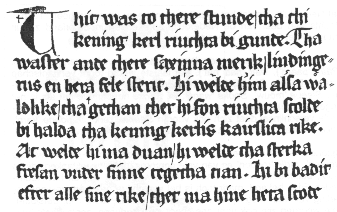 |
Thit was to there stunde|
tha thi
kening kerl riuchta bi gunde. Tha
waster ande there saxinna merik| liudinge-
rus en hera fele steric. Hi welde him alsa wa-
ldlike| tha gethan ther hi fon riuchta scolde
bi halda tha kening kerlis kairslica rike.
Ac welde hi ma duan| hi welde tha sterka
fresan under sinne tegetha tian. Hi bi badit
efter alle sine rike| thet ma hine heta scode |
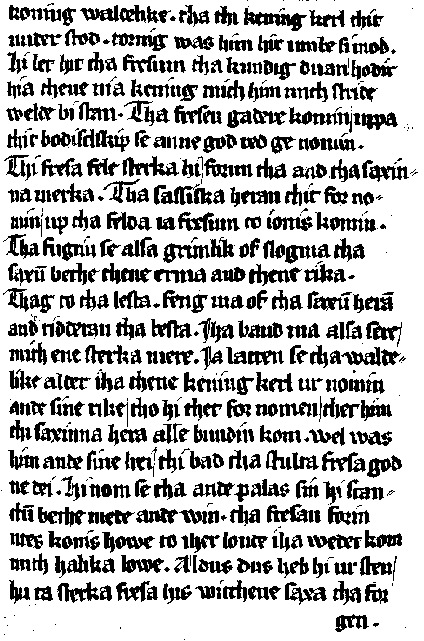 |
koning waldelike. tha thi kening kerl
thit
under stod. tornig was him hir umbe si mod.
Hi let hit tha fresum tha kundig duan| hodir
hia thene nia kening mith him mith strida
welde bi stan. Tha fresen gadere komin| uppa
thit bodisclscip se anne god red ge nomin.
Thi fresa fele sterka hi| forim tha and tha saxin-
na merka. Tha sassiska heran thit for no-
min| up tha felda ia fresum to ionis komin.
Tha fugtin se alsa grimlik of slogma tha
saxu~ bethe thene erma and thene rika.
Thag to tha lesta. feng ma of tha saxu~ hera~
and ridderan tha besta. Iha band ma alsa sere|
mith ene sterka mere. Ia latten se tha walde-
like alder iha thene kening kerl ur nomin
ande sine rike| tho hi thet for nomen| thet him
tha saxinna hera alle bundin kom. Wel was
him ande sine hei| thi bad tha stulta fresa god
ne dei. Hi nom se tha ande palas sin hi scan-
ctu~ bethe mede ande win. tha fresan forin
utes konis howe to iher londe iha weder kom
mith halika lowe. Aldus dus heb hi ursten|
hu ta sterka fresa his withthene saxa tha for-
gen. |
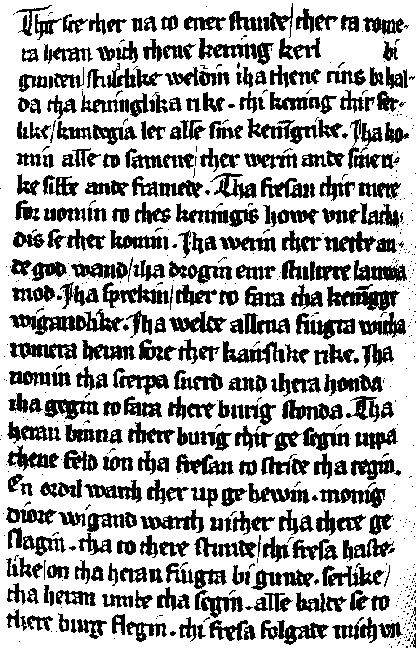 |
Thit sce ther na to ener stunde| thet
ta rome-
ra heran with thene kening kerl [strida] bi
gunden| stultlike weldin iha thene tins bihal-
da tha keninglika rike. thi kening thit ser-
like| kundegia let alle sine keni~grike. Iha ko-
min alle to samene| ther werin ande sine ri-
ke sibbe ande framede. Tha fresan thit mere
for nomin to thes keningis howe vnelatha-
dis se ther komin. Iha werin ther nette an-
de god wand| iha drogin enir stultere lauwa
mod. Iha sprekin| ther to fara tha keni~gge
wigandlike. Iha welde allena fiugta witha
romera heran fore thet kairslike rike. Iha
nomin tha scerpa suerd and ihera honda
iha gegin to fara there burig stonda. Tha
heran binna there burig thit ge segin uppa
thene feld ion tha fresan to stride tha tegin.
En ordil warth ther up ge hewin. monig
diore wigand warth nither tha there ge
slagin. tha to there stunde| thi fresa haste-
like| on tha heran fiugta bi gunde. serlike|
tha heran umbe tha segin. alle balde se to
there burg flegin. thi fresa folgade mith vn |
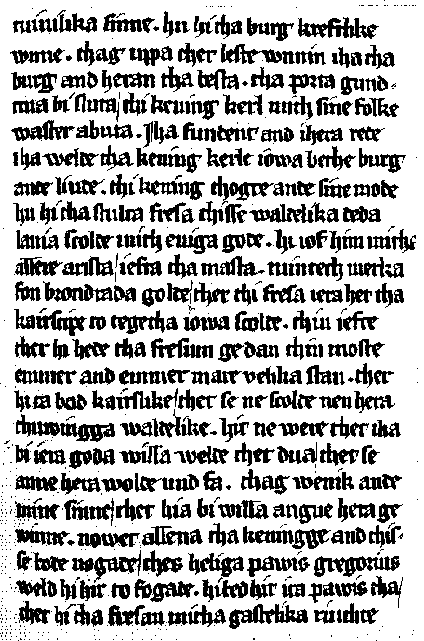 |
tuiuilika sinne. hu hi tha burg
kreftlike
wnne. thag uppa thet leste wnnin iha tha
burg and heran tha besta. tha porta gund-
tma bi sluta| thi kening kerl mith sine folke
waster abuta. Iha fundent and ihera rede
iha welde tha kening kerle iowa bethe burg
ande liude. thi kening thogte ande sine mode
hu hi tha stulta fresa thisse waldelika deda
lania scolde mith eniga gode. hi iof him mitha
allera arista| iefta tha masta. tuintech merka
fon brondrada golde| ther thi fresa iera het tha
kairscipe to tegetha iowa scolde. thiu iefte
ther hi hede tha fresum ge dan thiu moste
emmer and emmer mare velika stan. ther
hi ta bad kairslike| thet se ne scolde nen hera
thuwingga waldelike. hit ne were thet iha
bi iera goda willa welde thet dua| thet se
anne hera wolde und fa. thag wenik ande
mine sinne| thet hia bi willa angne hera ge
winne. nowet allena tha keningga and this-
se bode nogade| thes heliga pawis gregorius
weld hi hir to fogade. hi bed hit ita pawis tha|
thet hi tha fresan mitha gastelika riuchte |
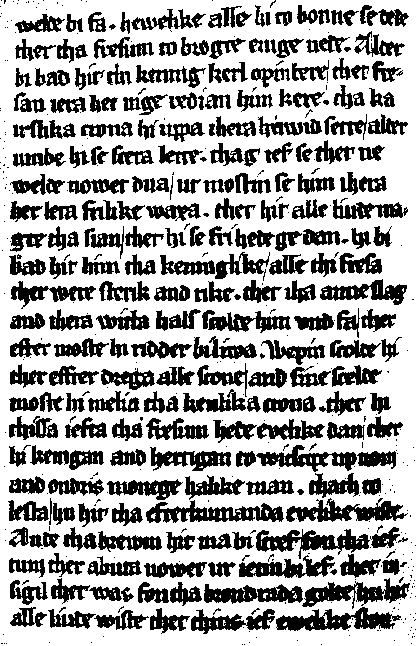 |
welde bi fa. hewelike alle hi to bonne
se dede
ther tha fresum to brogte enige nede. Alder
bi bad hit thi kening kerl opinbere| thet fre-
san iera hec nige redian him kere. tha ka
irslika crona hi uppa ihera huwid sette| alder
umbe hi se scera lette. thag ief se thet ne
welde nowet dua| ut mostin se him ihera
her leta frilike waxa. thet hit alle liude ma-
gte tha sian| thet hi se fri hede gedan. hi bi
bad hit him tha keninglike| alle thi fresa
ther were sterik and rike. thet iha anne slag
and ihera witta hals scolde him vnd fa| ther
efter moste hi ridder biliwa. Wepin scolde hi
ther effter drega alle scone| and sine scelde
moste hi melia tha kenlica crona. thet hi
thissa iefta tha fresum hede evelike dan| ther
hi kenigan and hertigan to witscipe up nom
and ondris monege halike man. thach to
lesta| hu hit tha efterkumanda evelike wiste.
Ande tha brewm hit ma bi scref| fon tha ief-
tum ther abuta nowet ur ietin bi lef. thet in-
sigil thet was fon tha brondrada golde| hu hit
alle liude wiste thet thius ief ewelike ston- |
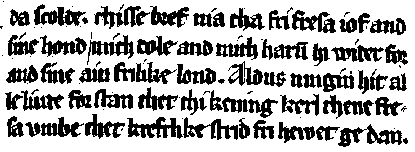 |
da scolde. thisse bref ma tha fri
fresa iof and
sine hond| mith dole and mith haru~ hi wider for
and sine ain frilike lond. Aldus mugin hit al-
le liude for stan thet thi kening kerl thene fre-
sa vmbe thet kreftlike strid fri hewet ge dan. |
This poem is part of a fine mediaeval manuscript from the
Dutch province of Groningen, the so called first Hunsinger Codex.
Although outside today's Frisian language areas and strongly
differing from modern Frisian, the language of the manuscript can
be related to Frisian and is called Old Frisian.
The manuscript is written on vellum and dates back from the
second half of the 13th century. It contains a variety of texts,
written closely together because of the precious material. Right
on top of the our poem, one finds the ten commandments at the
same page!
The aim of the poem is not just to make nice literature. The
rhyme is merely ment to remember the text for oral presentation.
It stands in a long tradition of the Frisians to keep their
independence from the feudal system. One of their arguments for
that was a privilege of Charlemagne and that is also the subject
of the poem. Another weapon was based on their old laws and as a
result, the Old Frisian law-texts are one of the richest
collections of mediaeval law-texts in the Germanic area. The
great variety of texts is a treasury of linguistic and historical
knowledge, which is only partly investigated. Not even all
manuscripts have been edited yet.
The language is antique even for the time the manuscript was
written. It shows a great number of full final vowels, a four
case system and a complicated declension.On the other hand, one
finds some influence from other languages, mainly LowGerman
(probably the language of the "Saxons" mentioned in the
poem). This can be seen in words like koning, na next to
kening, efter and kundig, gedan, ondris, opinbere
instead of kuth, den, otheris, epenbere, etc. The
spelling also shows many inconsequences and failures, inherent to
a still rather primitive writing system. Only a short time before
Latin had started to give in for the vernaculars and the monks
had only a short tradition in that.
An important thing to note, is that there is no indication of
the length of the vowels. Even vowels in open syllables might be
short. On the other hand, comparison with other old and modern
languages shows that many vowels will have been long. One will
find more about that in the literature mentioned below. The
intention of this file is only to give a first impression of a
group of manuscripts which often seems to escape observation,
presumably because they are not written in the national language
of a modern state.
In addition to the facsimile and the transciption, I will give
a modified text as presented by Sipma and an English translation
based on his Frisian text. The title Fon alra Fresena Fridome
'About the freedom of all Frisians' is not original, but added by
modern authors.
I hope you will excuse my somewhat clumsy English translation!
For the interest of the reader I also made a vocabulary with some
etymological connections. P. Kramer.
Some literature.
Ph. H. Breuker, Orientatie in de Frisistiek, Ljouwert/ Leeuwarden
1985.
J. Hoekstra, De eerste en de tweede Hunsinger Codex, Den Haag
1950.
T.L. Markey, Frisian, The Hague 1981.
P. Sipma, Fon alra Fresena Fridome, Snits [Sneek] 1947.
B. Sjölin, Einführung in das Friesische, Stuttgart 1969
(Sammlung Metzler M86).
Academic study of Frisian on a regular base is possible in
Amsterdam, Groningen, Kiel.
For more information see Orientation
in Frisian Studies
| Modified text (long vowels NOT YET
underlined) Thit was to there stunde
tha thi kening kerl riuchta bi gunde.
Tha waster ande there saxinna merik
liudingerus en hera fele steric.
Hi welde him tha gethan alsa waldelike
ther hi [fon riuchta] scolde bi halda tha kening kerlis
kairslica rike.
Ac welde hi ma duan
hi welde tha sterka fresan under sinne tegetha tian.
Hi bi badit efter alle sine rike
thet ma hine heta scode koning waldelike.
tha thi kening kerl thit under stod.
tornig was him hir umbe si mod.
Hi let hit tha fresum tha kundig duan
hodir hia thene nia kening mith him mith strida welde bi
stan.
Tha fresen gadere komin
uppa thit bodisscip se anne god red ge nomin.
Thi fresa fele sterka
hi for tha and tha saxinna merka.
Tha sassiska heran thit for nomin
up tha felda ia fresum to ionis komin.
Tha fugtin se alsa grimlike
of slogma tha saxum [bethe] thene erma and thene rika.
Thag to tha lesta.
feng ma of tha saxum heran [and ridderan] tha besta.
Iha band ma alsa sere
mith ene sterka mere.
Ia latten se tha waldelike
alder iha thene kening kerl ur nomin ande sine rike
tha hi thet fornom
thet him thi saxinna hera alle bundin kom.
Wel was him ande sine hei
thi bad tha stulta fresa godne dei.
Hi nom se tha ande palas sin
hi scanctum bethe mede ande win.
|
Translation It was at the time
that king Charles (Charlemagne) began to rule.
Then there was in the district of the Saxons
Liudingerus, a very strong lord.
He wanted to equip himself so strongly
that he would get king Charles' empire.
Also wanted he to do more;
hi wanted to bring the strong Frisians under his
authority.
He ordered in whole his realm
that he should be called mighty king.
As king Charles became aware of this,
then he was angry inside.
He announced to the Frisians
whether they with him would start a fight against the new
king.
The Frisians gathered;
on this message they took a good decision.
The Frisians very strongly
went to the district of the Saxons.
The Saxon lords became aware of that;
they came to meet the Frisians on the field.
Then they fought so grimly
they slew the Saxons both the poor and the rich.
But at last
they caught the best of the Saxon lords and knights.
Those they tied so much
with strong fetters.
Then they lead them by force
where they found king Charles in his realm.
When king Charles heard
that the Saxon lords came to him all tied,
he was very glad in his mind;
he welcomed the brave Frisians.
He then took them in his palace
and served them both mead and wine.
|
tha fresan forin utes koningis howe
to iher londe iha weder komin mith halika lowe.
Aldus dus heb hi ursten
hu ta sterka fresa his withthene saxa tha forgen.Thit
sce ther na to ener stunde
thet tha romera [heran] with thene kening kerl strida
bigunden
iha weldin stultlike
thene tins bihalda fon tha keninglika rike.
thi kening thit serlike
kundegia let alle sine keningrike.
Iha komin alle to samene
ther werin ande sine rike sibbe ande framede.
Tha fresan thit mere for nomin
to thes keningis howe vnelathadis se [ther] komin.
Iha werin ther nette ande god
wand iha drogin enir stultere lauwa mod.
Iha sprekin ther to fara tha keningge wigandlike.
Iha welde [allena] fiugta witha romera [heran]fore thet
kairslike rike.
Iha nomin tha scerpa suerd and ihera honda
iha gengin to fara there burig stonda.
Tha heran binna there burig thit ge segin
uppa thene feld ion tha fresan to stride tha tegin.
En ordil warth ther upgehewin.
monig diore wigand warth nither [tha there]geslagin.
tha to there stunde
thi fresa hastelike [on tha heran] fiugta bi gunde.
serlike tha heran umbe tha segin.
alle balde se to there burig flegin.
thi fresa folgade mith vntuiuilika sinne.
hu hi tha burg kreftlike wnne.
thag uppa thet leste
wnnin iha tha burg and heran tha besta.
tha porta gundtma bi sluta
thi kening kerl mith sine folke waster abuta.
|
The Frisians left the kings' court;
they arrived in their country with high praise.
So you have heard
how the strong Frisians then fared against the Saxons.There
after it occurred at a time
that the Roman lords began fight against king Charles.
They wanted recklessly
to keep the tax of the kingdom.
The king severely
announced this in whole his kingdom.
They came all together
who were in his realm, relatives and foreigners.
As the Frisians heard this news
they came to the kings court without being asked.
There they came in useful
because they had the courage of a brave lioness.
There they spoke to the king heroically
they would fight alone against the Roman lords for the
empire.
They took the sharp swords in their hands and
placed themselves in front of the castle.
The lords inside the castle saw this;
they went to fight against the Frisians on the field.
An ordeal was begun;
many valuable fighter was then there slain.
Then at that moment
the Frisians violently began to fight upon the lords.
Frightened the lords then looked back and
all of them flew quickly to the castle.
The Frisians followed with determined mind,
that they would win the castle with force.
But at last
they won the castle and the best of the lords.
People began to close the gates,
but king Charles and his troops were outside.
|
Iha fundent and ihera rede
iha welde tha kening kerle iowa [bethe] burg ande liude.
thi kening thogte ande sine mode
hu hi tha stulta fresa [thisse waldelika deda] lania
scolde
mith eniga gode.hi iof him mitha allera arista
iefta tha masta.
tuintech merka fon brondrada golde
ther thi fresa [iera hec] tha kairscipe
to tegetha iowa scolde.
thiu iefte ther hi hede tha fresum gedan
thiu moste emmer and emmermar evelika stan.
ther hi ta bad kairslikethet se ne scolde nen hera
thuwingga waldelike.
hit ne were thet iha bi [iera goda] willa welde thet
dua
thet se anne hera wolde und fa.
thag ne wenik ande mine sinne
thet hia bi willa angne hera gewinne.
nowet allena tha keningga and thisse bode nogade thes
heliga pawis [gregorius] weld hi hirto fogade.
hi bed hit ita pawis tha
thet hi tha fresan mitha gastelika riuchte welde bi fa.
hewelike alle hi to bonne se dede
ther tha fresum to brogte enige nede.
Alder bi bad hit thi kening kerl opinbere
thet fresan iera hec nige redian him kere.
tha kairslika crona hi uppa ihera huwid sette
alder umbe hi se scera lette.
thag ief se thet ne welde nowet dua
ut mostin se [him] ihera her leta frilike waxa.
thet hit alle liude magte tha sian
thet hi se fri hede gedan.
hi bibad hit him tha keninglike
alle thi fresa ther were sterik and rike.
thet iha anne slag and ihera witta hals scolde [him]
vnd fa
ther efter moste hi ridder biliwa.
Wepin scolde hi [ther effter] drega alle scone
and sine scelde moste hi melia tha keninglica crona.
|
The Frisians took a decision;
they would give king Charles both castle and garrison.
The king thought to himself
how he should repay the brave Frisians with some goods
for this enormous action.First of all he gave them
a great gift.
Twenty coins of fiery red gold
that the Frisians should give the empire yearly as tax
That gift that he gave the Frisians,
that should always and forever endure.
Besides he commanded imperially
that no lord should force them by power.
Unless it were that they would do it by their own free
will
that they would accept a lord.
But I don't think to myself,
that they by own will would recognize a lord.
The king was not satisfied with this order,
the authority of the holy pope he added to it.
He then asked it the pope
that he would put the Frisians under clerical rule.
He forever excommunicated all those
that the Frisians caused any trouble.
There commanded king Charles publicly that
the Frisians should choose new judges every year.
He put the imperial crown on their head,
therefore he ordered to shave them.
But if they did not want to do that,
they were allowed to let their hair grow freely.
that all people might see then
that he has made them free.
He commanded them then kingly,
all Frisians that were strong and rich,
that they should receive an accolade on their white
neck;
After that he should always be knight.
He should carry a very nice weapon;
on his shield he should paint the royal crown.
|
thet hi thissa iefta tha fresum hede evelike dan
ther hi kenigan and hertigan to witscipe up nom
and [ondris] monege halike man
thach to lesta
hu hit tha efterkumanda evelike wiste.Ande tha brewm
hit ma biscref
fon tha ieftum ther [abuta] nowet urietin bilef.
thet insigil thet was fon tha brondrada golde
hu hit alle liude wiste thet thius ief ewelike stonda
scolde.
thisse bref ma tha fri fresa iof and sine hond
mith dole and mith harum hi wider for and sine ain
frilike lond.
Aldus mugin hit alle liude forstan
thet thi kening kerl thene fresa
[vmbe thet kreftlike strid] fri hewet ge dan.
|
That he this gift had given the Frisians for ever
for that he took to witness kings and dukes
and many other high men.
But at last,
That the descendents should know forever,in the
letters it was written
about the gifts, that nothing should be forgotten.
The seal was of fiery red gold,
that all people should know that this gift should exist
forever.
This letter they gave the free Frisian in his hand.
With pride and with honour he went back to his own free
country.
In this way all people may understand
that king Charles the Frisians
has made free because of that strong fight.
|
Vocabulary
of the transcription
{} = etymological connections, Dat. = dative, Du. =
Dutch, Eng. = English, Ge. = German, Gen. =genitive. |
| Top |
abuta - outside {Du. buiten}
ac - also {Du. ook}
ain - own {Du. eigen}
alder - there; where {Du.aldaar}
alder umbe - because of that
aldus - thus
alle - all
allena - alone; only
allera arista - very first {Du.allereerst} alsa - so
and - and; in; on
angne - some {Du. enig}
anne - a
arista - first
bad - command; greet {Du.gebod}
bad, badit > bibad
balde - quickly {Ge. bald}
band - tied {bound}
bed - asked {Du. gebieden}
besta - best
bethe - bothbi - at, by
bi bad - commanded
bi badit - commanded it
bi fa - enclose {Du.omvatten}
bi gunde - began
bi halda - keep {Du.behouden}
bi lef - remained {Du. bleef}
bi scref - described {Du. be-schreef}
bi sluta - close {Du. sluiten}
bi stan - begin {Du. bestaan}
biliwa - remain {Du. blijven}
binna - inside {Du. binnen}
bode - order {Du. gebod}
bodisclscip = bodisscip -message {Du. boodschap}
bonne - excommunication{Du. ban}
bref - letter {Du. brief}
brewm - letters (Dat.)
brogte - brought
brondrada - as red as fire
bundin - tied {bound}
burg - castle {bury}
burig - castle
crona - crown
dan - done
deda - deed
dei - day
diore - valuable {dear}
dis se - this
dole - pride {Du. doel}
drega - carry {Du. dragen}
drogin - carried
dua - do
duan - do
dus - thus
effter - after
efter - after; to
efterkumanda - descendents
emmer - ever
en - aene - a
ener - of a
eniga - some
enige - some
enir - of a
erma - poor
evelike - forever
ewelike - forever
fa > bi fa, und fa
fara > to fara
feld - field
felda - field (Dat.)
fele - very {Du. veel}
feng - captured {Du. ving}
fiugta - fight
flegin - flew
fogade > to fogade
folgade - followed
folke - people, troops {folk}
fon - off {Du. von}
fon riuchta - rightly
for - went, travelled {Ge. fuhr}
forgen - fared {Du. vergaan}
for nomen - notice {Du. verne-men}
for nomin - notice
for stan = understand {Du.verstaan}
fore - for
forin - went, travelled
forim - went, travelled
framede - strangers {Du.vreemden}
fresa - Frisian
fresan - Frisians
fresum - Frisians (Dat.)
fri - freefrilike - freely
fugtin - fought
fundent - found it
gadere - together
gastelika - clerical {Du. geeste-lijk}
ge dan - done
ge hewin > up ge hewin
ge nomin - taken
ge segin - seen
ge slagin - defeated {Du.verslagen}
ge winne - get; recognize {win}
gedan - done
gegin = gengin - went to {Du.gingen}
gethan - conform to {Old Engl.getan}
god - good
goda - good
gode - goods
godne - good
golde - gold
gregorius - Gregory (pope)
grimlik - grimly
gundtma - started men to
gunde etc. > bi gunde etc.
halika - highly
hals - neck {Du. hals}
haru~ = harum - honour {Du.eer}
hastelike - severely {Du. haast}
heb - have
hec - each
hede - had
hei - mind {Du. geheugen}
heliga - holy
her - hair
hera - lord; lords {Du. heer}
hera~ = heran
heran - lords
hertigan - dukes {Du. hertog}
het = hec
heta - call {Du. heten}
hewelike - forever
hewet - has
hewin > up ge hewin |
hi - he; you
hia - they
him - him; he; they
hine - him {Ge. ihnen}
hir - here
hir umbe - about this
his - is
hit - it
hit ne were - unless {it not were}
hodir - whether
hond - hand
honda - hands
howe - court {Du. hof}
hu - how
huwid - head
ia - they
ief - gave
iefta - or {Du. of}
iefte - gift
ieftum - gifts (Dat.)
iera - year
iera - their {Ge. ihr}
ietin > ur ietin
iha - them; they
iher - their {Ge. ihr}
ihera - their
insigil - seal (on a letter)
iof - gave
ion - against {Ger. gen}
ionis > to ionis
iowa - give
irslika > ka irslika
ita = it tha - to the
kairscipe - emperorship {Du.keizer}
kairslike - imperial
kairslica - imperial
kenigan - kings
keni~gge = keninge - kings
keni~grike = keningrike -kingdom
kening - king
keningga - kings
keningis - of the king
keninglika - royal
keninglike - royal
kenlica - royal
kere - choose {Du. keuren}
kerl - Charle (Charlemagne)
kerle = kerl (Dat.)
kerlis = of Charles
kom - came
komin - came
koning - king
konis - of the king
kreftlike - with force {Du.kracht}
kundegia - proclaim {Du. ver-kondigen}
kundig duan - announce
lania - repay {Du. lonen}
latten - lead, brought
lauwa - lioness
lef > bi lef
lesta - last
let - ordered to {Du. liet}
leta - permit {Du. laten}
lette - ordered to
liude - people {Du. lieden}
liudingerus -[person's name]
lond - country {Du. land}
londe - country (Dat.)
lowe - praise {Du. lof}
ma - more
ma - they, people {Du. men}
magte - were allowed to {Du.mocht}
man - man
mar - more
mare velika = mar evelika
masta - most
mede - mead
melia - paint {Ge. malen}
mere - fetters {moor}
mere - news {Du. mare}
merik - district {Ge. Mark}
merka - district
merka - coins {Ge. Mark}
mine - my
mith - with {Du. met}
mitha - with the
mod - mind {Du. gemoed}
mod - courage {Du. moed}
mode - mind (Dat.)
monege - many
monig - many a
most - must, should
mostin - must, should
mugin - may
na - after {Du. na}
ne > god
nene - not
nede - harm {need}
nen - no
nette - useful {Du. nuttig}
nia - newnige - new
nither - down {Du. neer}
nogade - suffice {enough}
nom - took {Du. nam}
nomen - took
nomin - took
nomin > for-, ge-, ur-.
nowet - nothing
of - of
of slogma - felled they {Du.af/sloeg/men}
on - against
ondris - other {Du. anders}
opinbere - public {Du.openbaar}
ordil - ordeal
palas - palace
pawis - pope
porta - gate {Du. poort}
red - counsel {Du. raad}
rede - counsel (Dat.)
redian - judges {Du.raadgever}
ridder - knight {Du. ridder}
ridderan - knights
rika - rich
rike - realm; rich
riuchta - rule
riuchta > fon riuchta
riuchte - rights
romera - Roman
samene > to samene
sassiska - Saxon
saxa - Saxons
saxinna - Saxon |
saxu~ = saxum - Saxons
scactu~ = scanctum - served them {Du. schenken}
sce - happened {Du.geschieden}
scelde - shield
scera - shave {Du. scheren}
scerpa - sharp
scode - should
scolde - should
scone - beautifull {Du.schoon}
scref - wrote, > bi scref
se - they; them {Du. ze}
se > dis se
segin > ge segin, umbe segin
sere - severely {Du. zeer}
serlike - painful, frightened{sore}
sette - put (upon) {set}
si - his {Du. zijn}
sian - see
sibbe - relatives {Ge. Sippe}
sin - his {Du. zijn}
sine - his
sinne - his
slag - accolade, (blow) {Du.slag}
slagin > ge slagin
slogma > of slogma
sluta > bi sluta
sprekin - spoke
stan - stand
steric - strongly {Du. sterk}
sterik - strongly
sterka - strong
stod > under stod
stonda - stand; exist
strid - fight {Du. strijd}
strida - fight (Dat.)
stride - fight (Dat.)
stulta - brave {Ge. stolz}
stultere - brave (Gen.)
stultlike - bravely
stunde - hour, time
suerd - sword
ta = it tha
ta = to - to
tegetha - tithes
tegin - set out
tha - as; then; when {Ge. da}
tha - the
thach - but {Du. toch}
thag - yet; but
thene - the; those {Ge. den}
ther - there; that; the; becauseof
ther na - after that
ther efter - after that
ther .. up - upon that
thes - of the {Ge. des}
thet - that; the
thi - the; he
thissa - this; these
thit - this; it
thiu - she
thius - this
tho - when {Ge. da}
thogte - thought
thuwingga - force {Du.dwingen}
tian - draw {Ge. ziehen}
tins - tax {Ge. Zins}
to - at; to
to brogte - cause (trouble)
to fara - in front of {before}
to fogade - added {Du. toevoe-gen}
to ionis komin - came to meet
to samen - together {Du. teza-men}
tornig - wrathfull {Du. toornig}
tuintech - twenty
tuiuilika > vn tuiuilika
umbe > alder umde, hir umbe
umbe segin - looked back {Du.omzien}
und fa - accept {Du.ontvangen}
under - under
under stod - understood
up - on
up ge hewin - begun {Du. aan-heffen} uppa - on; upon
uppa thet lesta - at last
ur ietin - forgotten
ur nomin - noticed {Du.vernomen}
ur sten - understood
ut waxa - grow out
utes = ut thes - out of the
velika > mare
vmbe - because of
vnd fa - receive
vnelathadis - uninvited {Ge.uneingeladen}
vn tuiuilika - unquestionable{Du. ontwijfelbaar}
waldelika - enormous {Du. ge-weldig} waldelike - by
force;enormous
waldlike - powerfull
wand - because {Du. want}
warth - became; was {Du.werd}
was - was
waster - was there
waxa - grow {Ge. wachsen}
weder - again {Ge. wieder}
weder kom - returned
wel - good {well}
weld - authority {Ge. Verwal-tung}
welde - wanted to, would
weldin - wanted to, would
wenik = wene ik - am I thinking {Du. wanen}
wepin - weapons
were - were (> hit)
werin - were
wider for - returned
wigand - fighter {Old Eng. wi-gend}
wigandlike - heroic
willa - will, wish
win - wine
winne > ge winne
wist - knew
with - against {Ge. wider}
witha = with tha - against the
withthene = with thene -against those
witscipe - witness
witta - white
wnne - should win
wnnin - won
wolde - wanted to, would
|
Back to: english.htm





